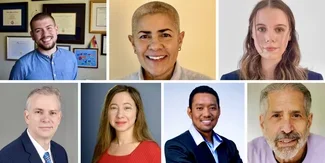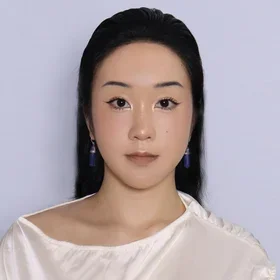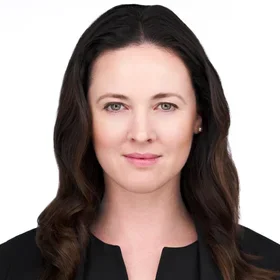More than ten alumni and three faculty members from the Negotiation and Conflict Resolution (NECR) program at Columbia’s School of Professional Studies currently serve as ombuds, playing critical roles in investigating and resolving conflicts within a diverse array of institutions such as colleges and universities, government agencies, and NGOs.
In celebration of the annual Ombuds Day on October 10, we asked NECR faculty and alumni to share their experiences, roles, and insights into this vital and growing profession.
For students interested in an ombuds career, the NECR program offers a spring elective called Fundamentals of Ombuds Practice (NECR5090), in addition to personalized advising and support on entering the field.

(l to r, clockwise from top left): Hans Kohler, Marilyn Molina, Elise Ramos, Steven (Steve) Goodstein, Lailul Ikram, Amy Sereday, Camilo Azcarate
Amy Sereday, NECR ’15
Lecturer, Fundamentals of Ombuds Practice (NECR5090), Conflict Analysis Models & Frameworks (NECR6050)
College Ombuds, Springfield College
Ombuds are trusted advisors for organizations that value creating a more responsive and inclusive culture. As college ombuds at Springfield College, I get to promote positive culture by cultivating the conditions for change on the individual, group, and organizational levels. I serve as a conflict coaching resource for students, staff, and faculty, providing them with a confidential space to talk about an issue or concern, engage in problem-solving, and explore options to resolve conflicts. In addition to working one-on-one, I also work with groups to facilitate dialogue, team building, and constructive decision-making. Being tapped into the community, an ombuds is uniquely positioned to elevate trends and bring systemic concerns to the attention of the organization in real time while protecting the confidentiality of visitors to the office. Through my work with individuals and teams, I assess the needs of the community and provide opportunities to build conflict-resolution skills through a variety of workshops.
Thanks to the NECR program, I have a wide variety of tools and skills available to me. From implicit bias and self-awareness to mediation and nonviolent communication, conflict-resolution skills are a fundamental part of my work. The most valuable skill by far is self-reflection, which affords me the ability to give critical thought to my work and foster continued growth as a person and a practitioner.
Lailul Ikram, NECR ’18
Ombudsperson, Mediator, Director of Interfaith Initiatives
Adjunct Professor of Business, Earlham College
As the ombudsperson, mediator, and director of Interfaith Initiatives, I provide a confidential, neutral, and impartial forum where individuals can voice concerns, explore options, problem-solve, and promote accountability. My role requires fostering open dialogue, resolving conflicts, and guiding conversations between diverse community members to ensure fair treatment. I utilize a range of skills, including active listening, cultural sensitivity, and neutrality, to assist people in navigating complex challenges and conflicts within the campus community.
In this role, I’ve seen firsthand how effective mediation can transform deep-seated conflict into opportunities for healing and growth. By providing a neutral space and guiding discussions, I’ve been able to help parties shift their perspectives, rebuild trust, and reach resolutions that honor their shared humanity. The ability to engage in restorative conversations has allowed me to witness conflicts evolve from sources of tension into learning experiences for both individuals and the broader community.
It’s very rewarding to know that my work matters and that small interactions can have such a big and positive impact. —Elise Ramos, NECR ’23
Marilyn Molina, NECR ’10
Associate Ombuds Officer, Columbia University
As the associate ombuds of Columbia University, I work at creating a safe, confidential space for students, faculty, staff, and affiliates to discuss conflicts, grievances, or concerns. I listen impartially, help clarify issues, and explore potential options that might lead to resolution. Visitors choose the path that best fits their needs, which sometimes means simply having someone to talk to confidentially without taking further action. Often, the opportunity to be heard in a private setting is what visitors value most.
Hypothetical visitor session: An employee expressed frustration with their supervisor’s communication style, feeling deflated, dismissed, and undervalued. I listened to their concerns, helped them identify the core issues, and explored various options to address the situation constructively with their supervisor. The skills used during this session included empathetic listening, conflict analysis, and problem-solving. The goal was to empower the visitor to handle the conflict in a way that felt right for them.
As an ombuds, I work to transform conflicts, which reduces tensions and helps prevent further escalation. It’s all about helping people feel understood and making our Columbia University community a better place to work and learn.
Camilo Azcarate, JD
Chief Ombuds, International Committee of the Red Cross
Lecturer, Conflict Resolution and Dynamical Systems (NECR5210)
If a mediator’s role can be compared to that of a specialized surgeon, the work of an ombuds is that of a general practitioner. Although the general principles that govern both practices are the same—confidentiality, impartiality, independence—and the basic skills similar, our practices are also somewhat different. Like general practitioners, ombuds develop long-term relationships with their clients. Although ombuds work with individual visitors in a wide variety of cases, we also have responsibility to provide systemic feedback to protect the overall health of the organization and prevent unhealthy dynamics. On the other hand, mediators tend to work intensely on individual disputes, focusing their efforts on achieving settlements that provide closure to the parties involved. As much as in medicine, both practices are necessary to maintain the health and well-being of an organization.
Hans Kohler, NECR ’15
Conflict Resolution Specialist and Ombuds
Associate Editor of the Journal of the International Ombuds Association
As an ombuds, I focus on helping people within organizations navigate conflicts constructively, encouraging them to advocate for themselves, challenge perspectives, and analyze systemic issues to propose potential changes within the organization. In my experience as an ombuds, I have seen this influence positively impact policies, prevent litigious proceedings, and, most importantly, improve the well-being of the people. When you become an ombuds, it often becomes a role you embody in all aspects of your life.
By providing a neutral space and guiding discussions, I’ve been able to help parties shift their perspectives, rebuild trust, and reach resolutions that honor their shared humanity. —Lailul Ikram, NECR ’18
Elise Ramos, NECR ’23
Ombuds Program Manager, MWI
I am so grateful to be able to work in the ombuds field. It is a beautiful feeling to know that I can provide a safe and confidential space for people to talk about concerns that keep them up at night and can help them navigate options and discover multiple paths to move forward through a difficult situation.
Not only do ombuds work with people on an individual level, but by identifying trends and raising anonymized concerns to organizational leadership, they can inform impactful organizational change. It’s very rewarding to know that my work matters and that small interactions can have such a big and positive impact.
Steven (Steve) Goodstein, NECR ’10
CPA Ombuds
While many think of an organizational ombuds as primarily focusing on one-on-one interaction between the ombuds and the visitor, the role also can lead workshop trainings on conflict resolution and difficult conversations. These trainings are crucial for fostering open communication and improving team dynamics in high-stress environments.
Recently, I led a workshop for 12 charge nurses in a high- pressure acute hospital department known for its tough culture and poor communication. Initially scheduled for 90 minutes, the workshop extended to three hours, as the participants opened up, shared vulnerabilities, and developed strategies for addressing difficult conversations around bias and role expectations. Their commitment to improving communication led to a positive shift, and I was invited back to continue building on this progress.
About the Program
Columbia University’s Master of Science in Negotiation and Conflict Resolution prepares students to analyze the root causes and dynamics of conflict and to transform disputes through reasoned and resourceful interventions. The program focuses on developing self-awareness, tenacity, and interpersonal competency; building common ground; opening lines of communication; ensuring representation and recognition; and building sustainable possibilities for resolution.


